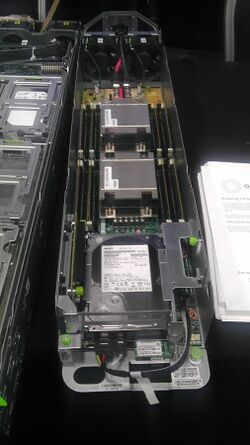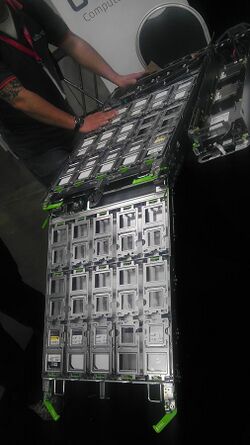Organization:Open Compute Project
 | |
| Formation | 2011 |
|---|---|
| Type | Industry trade group |
| Purpose | Sharing designs of data center products |
| Website | opencompute |
The Open Compute Project (OCP) is an organization that shares designs of data center products and best practices among companies, including Arm, Meta, IBM, Wiwynn, Intel, Nokia, Google, Microsoft, Seagate Technology, Dell, Rackspace, Hewlett Packard Enterprise, NVIDIA, Cisco, Goldman Sachs, Fidelity, Lenovo and Alibaba Group.[1][2][3]
Project structure
The Open Compute Project Foundation is a 501(c)(6) non-profit incorporated in the state of Delaware. Rocky Bullock serves as the Foundation's CEO and has a seat on the board of directors. As of July 2020, there are 7 members who serve on the board of directors which is made up of one individual member and six organizational members. Mark Roenigk (Facebook) is the Foundation's president and chairman. Andy Bechtolsheim is the individual member. In addition to Mark Roenigk who represents Facebook, other organizations on the Open Compute board of directors include Intel (Rebecca Weekly), Microsoft (Kushagra Vaid), Google (Partha Ranganathan), and Rackspace (Jim Hawkins).[4]
A current list of members can be found on the opencompute.org website.
History
The Open Compute Project began in Facebook as an internal project in 2009 called "Project Freedom". The hardware designs and engineering team were led by Amir Michael (Manager, Hardware Design)[5][6][7] and sponsored by Jonathan Heiliger (VP, Technical Operations) and Frank Frankovsky (Director, Hardware Design and Infrastructure). The three would later open source the designs of Project Freedom and co-found the Open Compute Project.[8][9] The project was announced at a press event at Facebook's headquarters in Palo Alto on April 7, 2011.[10]
OCP projects
The Open Compute Project Foundation maintains a number of OCP projects, such as:
Server designs
Two years after the Open Compute Project had started, with regards to a more modular server design, it was admitted that "the new design is still a long way from live data centers".[11] However, some aspects published were used in Facebook's Prineville data center to improve energy efficiency, as measured by the power usage effectiveness index defined by The Green Grid.[12]
Efforts to advance server compute node designs included one for Intel processors and one for AMD processors. In 2013, Calxeda contributed a design with ARM architecture processors.[13] Since then, several generations of OCP server designs have been deployed: Wildcat (Intel), Spitfire (AMD), Windmill (Intel E5-2600), Watermark (AMD), Winterfell (Intel E5-2600 v2) and Leopard (Intel E5-2600 v3)[14][15]
Data storage
Open Vault storage building blocks offer high disk densities, with 30 drives in a 2U Open Rack chassis designed for easy disk drive replacement. The 3.5 inch disks are stored in two drawers, five across and three deep in each drawer, with connections via serial attached SCSI.[16] This storage is also called Knox, and there is also a cold storage variant where idle disks power down to reduce energy consumption.[17] Another design concept was contributed by Hyve Solutions, a division of Synnex in 2012.[18][19] At the OCP Summit 2016 Facebook together with Taiwanese ODM Wistron's spin-off Wiwynn introduced Lightning, a flexible NVMe JBOF (just a bunch of flash), based on the existing Open Vault (Knox) design.[20][21]
Rack designs
The designs for a mechanical mounting system have been published, so that open racks have the same outside width (600 mm) and depth as standard 19-inch racks, but are designed to mount wider chassis with a 537 mm width (21 inches). This allows more equipment to fit in the same volume and improves air flow. Compute chassis sizes are defined in multiples of an OpenU, which is 48 mm, slightly taller than the typical 44mm rack unit.
Energy efficient data centers
The OCP has published data center designs for energy efficiency. These include power distribution at 277 VAC, which eliminates one transformer stage in typical data centers, a single voltage (12.5 VDC) power supply designed to work with 277 VAC input, and 48 VDC battery backup.[12]
Open networking switches
On May 8, 2013, an effort to define an open network switch was announced.[22] The plan was to allow Facebook to load its own operating system software onto the switch. Press reports predicted that more expensive and higher-performance switches would continue to be popular, while less expensive products treated more like a commodity (using the buzzword "top-of-rack") might adopt the proposal.[23]
The first attempt at an open networking switch by Facebook was designed together with Taiwanese ODM Accton using Broadcom Trident II chip and is called Wedge, the Linux OS that it runs is called FBOSS.[24][25][26] Later switch contributions include "6-pack" and Wedge-100, based on Broadcom Tomahawk chips.[27] Similar switch hardware designs have been contributed by: Edgecore Networks Corporation (Accton spin-off), Mellanox Technologies, Interface Masters Technologies, Agema Systems.[28] Capable of running Open Network Install Environment (ONIE)-compatible network operating systems such as Cumulus Linux, Switch Light OS by Big Switch Networks, or PICOS by Pica8.[29] A similar project for a custom switch for the Google platform had been rumored, and evolved to use the OpenFlow protocol.[30][31]
Servers
Sub-project for Mezzanine (NIC) OCP NIC 3.0 specification 1v00 was released in late 2019 establishing 3 form factors: SFF, TSFF, and LFF .[32][33]
Litigation
In March, 2015,[34] BladeRoom Group Limited and Bripco (UK) Limited sued Facebook, Emerson Electric Co. and others alleging that Facebook has disclosed BladeRoom and Bripco's trade secrets for prefabricated data centers in the Open Compute Project.[35] Facebook petitioned for the lawsuit to be dismissed,[36] but this was rejected in 2017.[37] A confidential mid-trial settlement was agreed in April 2018.[38]
See also
- Novena (computing platform)
- OpenBMC
- Open-source computing hardware
- OpenPOWER Foundation
- Telecom Infra Project – Facebook sister project focusing on Optical broadband networks and open cellular networks
References
- ↑ Metz, Cade (11 Apr 2015). "How Facebook Changed the Basic Tech That Runs the Internet". Wired. https://www.wired.com/2015/03/facebook-got-even-apple-back-open-source-hardware/.
- ↑ "Incubation Committee". http://www.opencompute.org/about/ocp-incubation-committee/.
- ↑ "Open Compute Project". https://www.opencompute.org/membership/membership-organizational-directory.
- ↑ "Organization and Board". http://www.opencompute.org/about/organization-and-board/.
- ↑ "Facebook Follows Google to Data Center Savings" (in en). 2009-11-27. https://www.datacenterknowledge.com/archives/2009/11/27/facebook-follows-google-to-data-center-savings.
- ↑ "Oxide Computer Company: On the Metal: Amir Michael" (in en). https://oxide.computer/podcast/on-the-metal-2-amir-michael/.
- ↑ "Facebook Hacks Shipping Dock Into World-Class Server Lab" (in en-us). Wired. ISSN 1059-1028. https://www.wired.com/2012/01/facebook-server-lab/. Retrieved 2020-12-13.
- ↑ "Why I Started the Open Compute Project – Vertex Ventures" (in en-US). http://old.vertexventures.com/2015/06/why-i-started-the-open-compute-project/.
- ↑ "Introducing the Open Compute Project - YouTube". https://www.youtube.com/watch?v=p4D9UNXKGV4&ab_channel=FacebookApp.
- ↑ "Facebook Opens its Server, Data Center Designs" (in en). 2011-04-07. https://www.datacenterknowledge.com/archives/2011/04/07/facebook-opens-its-server-data-center-designs.
- ↑ Metz, Cade (January 16, 2013). "Facebook Shatters the Computer Server Into Tiny Pieces". Wired. https://www.wired.com/wiredenterprise/2013/01/facebook-server-pieces/. Retrieved July 9, 2013.
- ↑ 12.0 12.1 Michael, Amir (February 15, 2012). "Facebook's Open Compute Project". Stanford EE Computer Systems Colloquium. Stanford University. http://www.stanford.edu/class/ee380/Abstracts/120215.html. (video archive)
- ↑ Schnell, Tom (January 16, 2013). "ARM Server Motherboard Design for Open Vault Chassis Hardware v0.3 MB-draco-hesperides-0.3". http://www.opencompute.org/wp/wp-content/uploads/2013/01/Open_Compute_Project_ARM_Server_Specification_v0.3.pdf.
- ↑ Data Center Knowledge (April 28, 2016). "Guide to Facebook's Open Source Data Center Hardware". http://www.datacenterknowledge.com/archives/2016/04/28/guide-to-facebooks-open-source-data-center-hardware/.
- ↑ Register, The (January 17, 2013). "Facebook rolls out new web and database server designs". https://www.theregister.co.uk/2013/01/17/open_compute_facebook_servers/.
- ↑ Mike Yan and Jon Ehlen (January 16, 2013). "Open Vault Storage Hardware V0.7 OR-draco-bueana-0.7". http://www.opencompute.org/wp/wp-content/uploads/2013/01/Open_Compute_Project_Open_Vault_Storage_Specification_v0.7.pdf.
- ↑ "Under the hood: Facebook's cold storage system". May 4, 2015. https://code.facebook.com/posts/1433093613662262/-under-the-hood-facebook-s-cold-storage-system-/.
- ↑ "Hyve Solutions Contributes Storage Design Concept to OCP Community". News release. January 17, 2013. http://ir.synnex.com/releasedetail.cfm?ReleaseID=733922.
- ↑ Malone, Conor (January 15, 2012). "Torpedo Design Concept Storage Server for Open Rack Hardware v0.3 ST-draco-chimera-0.3". http://www.opencompute.org/wp/wp-content/uploads/2013/01/Open_Compute_Project_Storage_Server_for_Open_Rack_Specification_v0.3.pdf.
- ↑ Petersen, Chris (March 9, 2016). "Introducing Lightning: A flexible NVMe JBOF". https://code.facebook.com/posts/989638804458007/introducing-lightning-a-flexible-nvme-jbof/.
- ↑ "Wiwynn Showcases All-Flash Storage Product with Leading-edge NVMe Technology". March 9, 2016. http://www.wiwynn.com/english/company/newsinfo/23.
- ↑ Jay Hauser for Frank Frankovsky (May 8, 2013). "Up next for the Open Compute Project: The Network". Open Compute blog. https://www.opencompute.org/news/up-next-for-the-open-compute-project-the-network.
- ↑ Chernicoff, David (May 9, 2013). "Can Open Compute change network switching?". ZDNet. http://www.zdnet.com/can-open-compute-change-network-switching-7000015141/.
- ↑ "Facebook Open Switching System (FBOSS) from Facebook". https://www.sdxcentral.com/projects/facebook-open-switching-system-fboss/reports/2017/open-source-networking/.
- ↑ "Introducing "Wedge" and "FBOSS," the next steps toward a disaggregated network". June 18, 2014. https://code.facebook.com/posts/681382905244727/introducing-wedge-and-fboss-the-next-steps-toward-a-disaggregated-network/.
- ↑ "Facebook Open Switching System ("FBOSS") and Wedge in the open". March 10, 2015. https://code.facebook.com/posts/843620439027582/facebook-open-switching-system-fboss-and-wedge-in-the-open/.
- ↑ "Opening designs for 6-pack and Wedge 100". March 9, 2016. https://code.facebook.com/posts/203733993317833/opening-designs-for-6-pack-and-wedge-100/.
- ↑ "Accepted or shared hardware specifications". http://www.opencompute.org/wiki/Networking/SpecsAndDesigns.
- ↑ "Current Network Operating System (NOS) List". http://www.opencompute.org/wiki/Networking/ONIE/NOS_Status.
- ↑ Metz, Cade (May 8, 2013). "Facebook Rattles Networking World With 'Open Source' Gear". Wired. https://www.wired.com/wiredenterprise/2013/05/facebook_networking/. Retrieved July 9, 2013.
- ↑ Levy, Steven (April 17, 2012). "Going With the Flow: Google's Secret Switch to the Next Wave of Networking". Wired. https://www.wired.com/wiredenterprise/2012/04/going-with-the-flow-google/. Retrieved July 9, 2013.
- ↑ "Server/Mezz - OpenCompute". https://www.opencompute.org/wiki/Server/Mezz.
- ↑ Kumar, Rohit (2022-05-02). "OCP NIC 3.0 Form Factors The Quick Guide" (in en-US). https://www.servethehome.com/ocp-nic-3-0-form-factors-quick-guide-intel-broadcom-nvidia-meta-inspur-dell-emc-hpe-lenovo-gigabyte-supermicro/.
- ↑ "BladeRoom Group Limited et al v. Facebook, Inc.". https://dockets.justia.com/docket/california/candce/5:2015cv01370/286012.
- ↑ "ORDER granting in part and denying in part 128 Motion to Dismiss". https://docs.justia.com/cases/federal/district-courts/california/candce/5:2015cv01370/286012/193.
- ↑ Greene, Kat (10 May 2016). "Facebook Wants Data Center Trade Secrets Suit Tossed". Law360. https://www.law360.com/ip/articles/794537/facebook-wants-data-center-trade-secrets-suit-tossed.
- ↑ SVERDLIK, YEVGENIY (17 February 2017). "Court Throws Out Facebook's Motion to Dismiss Data Center Design Lawsuit". Data center Knowledge. http://www.datacenterknowledge.com/archives/2017/02/17/court-throws-facebooks-motion-dismiss-data-center-design-lawsuit/.
- ↑ "Facebook settles $365m modular datacentre IP theft case with UK-based BladeRoom Group". 11 April 2018. https://www.computerweekly.com/news/252438774/Facebook-settles-365m-modular-datacentre-IP-theft-case-with-UK-based-BladeRoom-Group.
External links
- Data Centers
- Videos
- HC23-T2: The Open Compute Project on YouTube, Hot Chips 23, 2011 2.5 Hour Tutorial
- Facebook Open Compute Server on YouTube, Facebook V1 Open Compute Server
- Hyve: Adapting Facebook's Servers for Your Data Center on YouTube, Open Compute starts at 5:40
- Case Studies
 |



